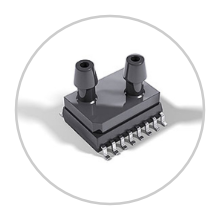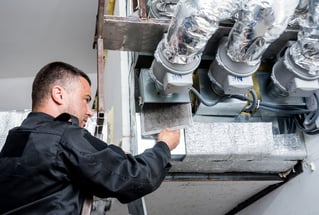 HVAC sensors are essential for maintaining set conditions within indoor environments. These innovative technology pieces allow HVAC equipment to measure environmental factors and adjust accordingly based on set parameters. The HVAC sector relies upon sensors in diverse settings to facilitate varying degrees of control over airflow, temperature, and more.
HVAC sensors are essential for maintaining set conditions within indoor environments. These innovative technology pieces allow HVAC equipment to measure environmental factors and adjust accordingly based on set parameters. The HVAC sector relies upon sensors in diverse settings to facilitate varying degrees of control over airflow, temperature, and more.
Servoflo distributes a wide variety of sensor types, including humidity, pressure, and mass flow sensors. This blog post will discuss some of the most frequently used sensor types and their HVAC applications.
HVAC Applications
HVAC systems can be large energy consumers, so choosing the right sensors is essential to controlling your environment efficiently. Utilizing ventilation sensors can have a significant positive impact on energy costs. Sensors allow precision control of many indoor environmental factors, such as humidity, air quality, energy efficiency, and more.
There are many sensor applications within the HVAC industry. Some of the most common HVAC sensor applications include:

Ventilation Monitoring
Monitoring a facility’s ventilation systems helps maintain good air quality, control humidity, and remove potentially harmful gases and pollutants. Controlling the amount of outdoor air that enters a space will prevent potentially expensive problems, such as mold growth from high indoor moisture levels. Ventilation monitoring is also essential for the proper filtration of smoke, dust, and odors.
Maintaining Indoor Air Quality
There are several types of sensors that can help measure and maintain indoor air quality. Sensors measure humidity, temperature, room pressure, and other factors that affect the air quality and comfort level in a space. Monitoring ventilation and controlling pressurization can have a significant impact on indoor air quality.
Providing Temperature Comfort Indoors
One of the essential functions of sensors used in the HVAC industry is temperature control. Adequate heating and cooling are critical for indoor spaces, and sensors allow indoor temperature monitoring to ensure control systems are functioning correctly.
HVAC Sensor Types
Pressure sensors monitor for unexpected pressure drops or increases in a heating or cooling system. This careful monitoring facilitates optimal airflow, heating, and cooling functions, all of which are essential to providing good air quality. There are many types of pressure sensors that used throughout the HVAC industry:
-
Building Automation Sensors. Building automation sensors measure differential pressures, allowing automated HVAC systems to adjust settings accordingly to maintain optimal system pressure. This technology allows the room or building to work at optimal efficiency, saving energy and resources.
-
Variable Air Volume Sensors. Variable air volume sensors allow large spaces to maintain consistent air temperature by measuring air volume and precisely controlling it to deliver proper air motion, distribution, and dilution.
-
Central Air Conditioning Filter Sensors. These sensors measure the pressure on either side of an air conditioner’s filter and use that information to determine when the filter screen needs cleaning or replacement. When the sensor detects reduced airflow, it sends a signal that the filter requires maintenance.
-
Duct Static Pressure Sensors. Duct static pressure sensors monitor natural gas pressure, making them an essential component in natural gas applications. Low pressure impacts the ability to use and move natural gas in a system, while high pressures create a risk for a gas leak or explosion.
-
Boiler and Burner Sensors. Controlling the air pressure in boilers and burners is essential for ensuring efficient combustion and regulation of fuel. Pressure sensors measure the air pressure throughout the supply channel and allow users to control the oven’s atmosphere.
-
Data Center Sensors. Data centers require critical pressure, temperature and humidity measurement to keep networks running smoothly. Our various sensors chosen here are ideal for data center environmental monitoring.
-
Critical Environments Sensors. Cleanrooms, negative pressure rooms, biological safety cabinets and fume hoods require pressure sensors to maintain personnel and product integrity. Typically low pressure monitoring is used as part of a control system.
-
Environmental Monitoring & IAQ System Sensors. Instruments for testing environmental and indoor air quality measure various parameters such as humidity, temperature, room pressure and more. Servoflo offers a variety of pressure, humidity and temperature sensors that can be monitored remotely.
HVAC Sensors From Servoflo
There are numerous types of sensors used throughout the HVAC industry. Choosing the right sensor will significantly impact your facility’s ability to control air quality, energy efficiency, and temperature. Servoflo is proud to supply the HVAC industry with sensors for nearly every relevant application. Contact us today and allow us to help you identify the right solution for your needs.

